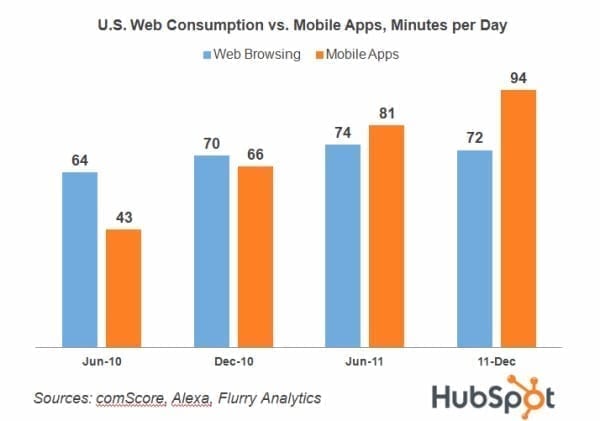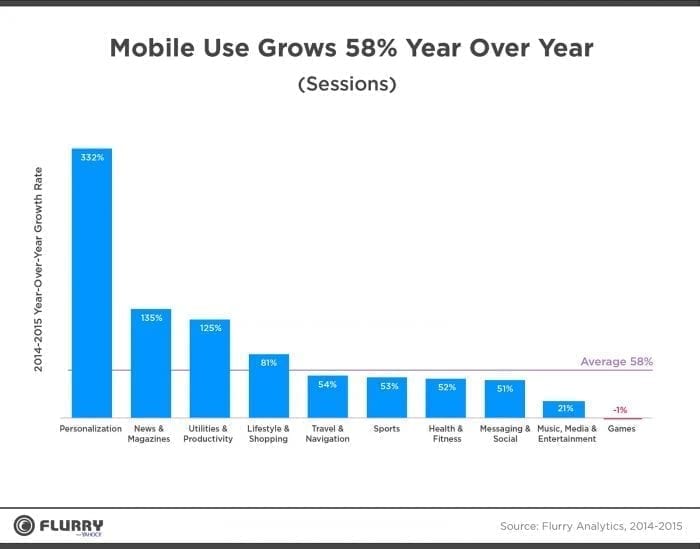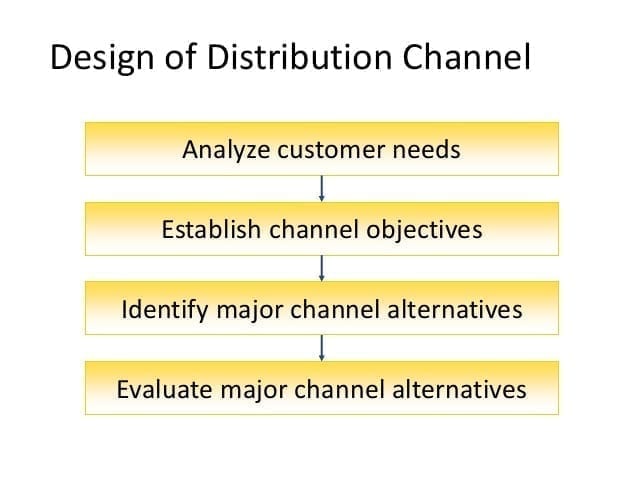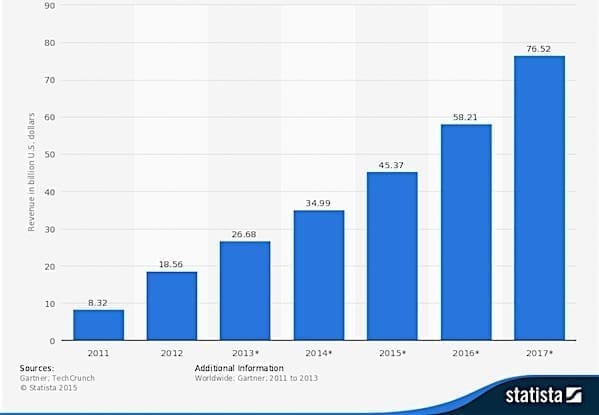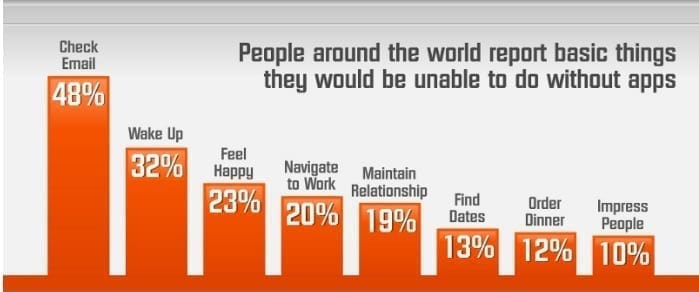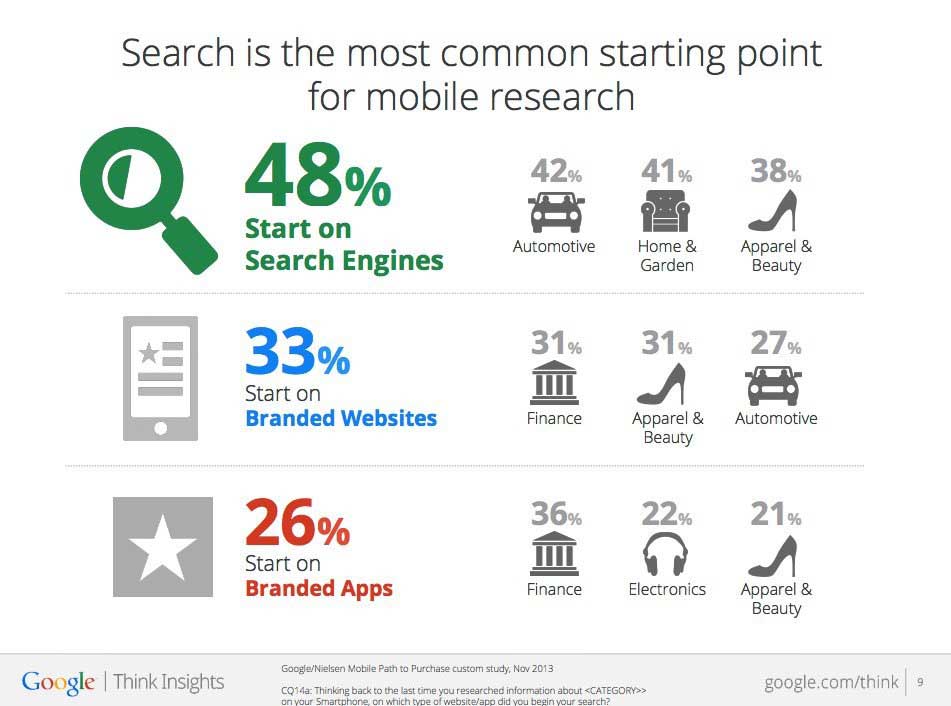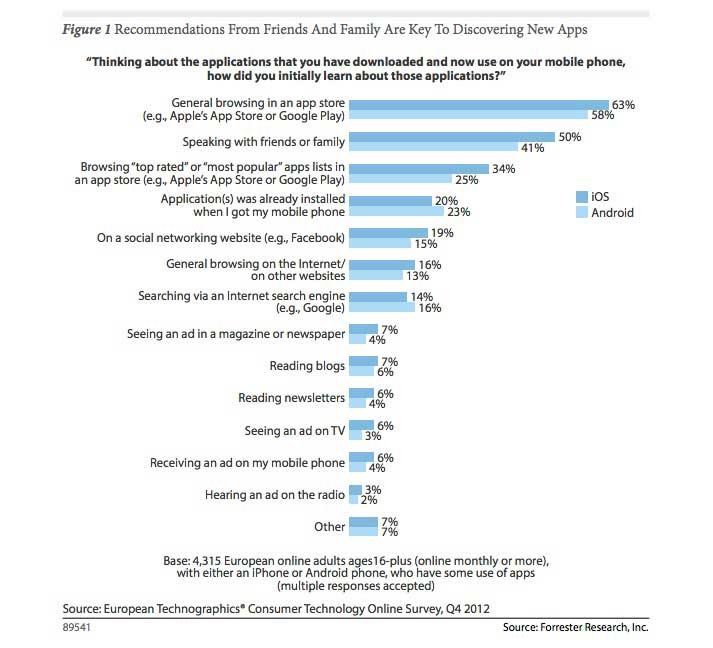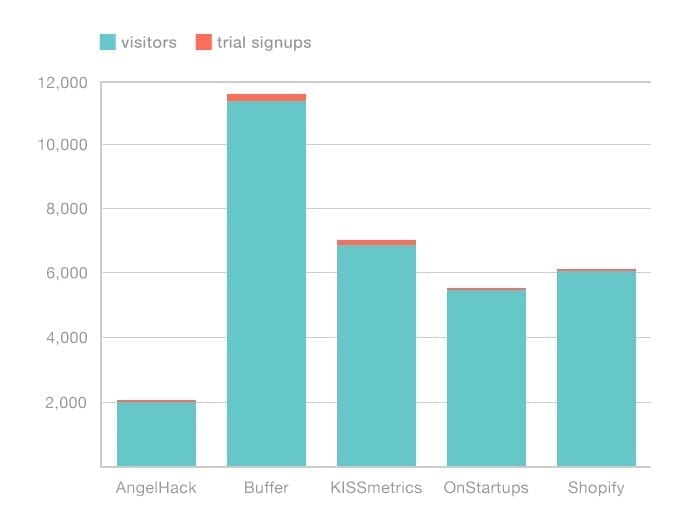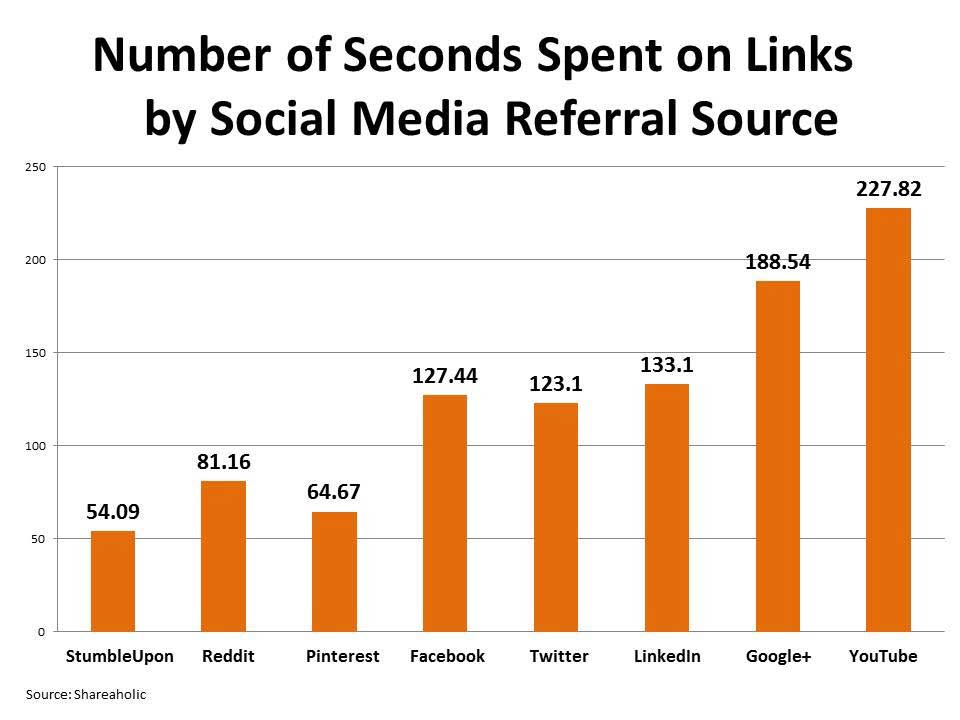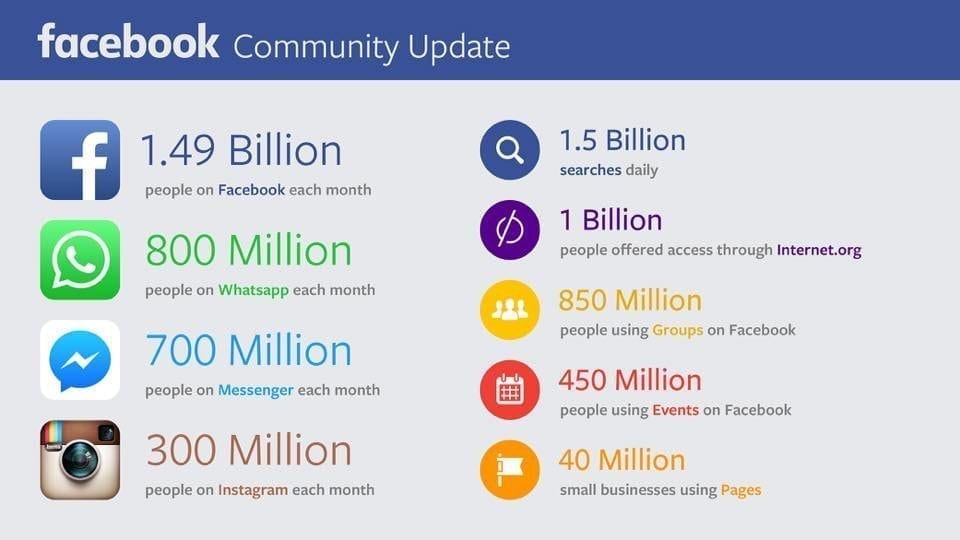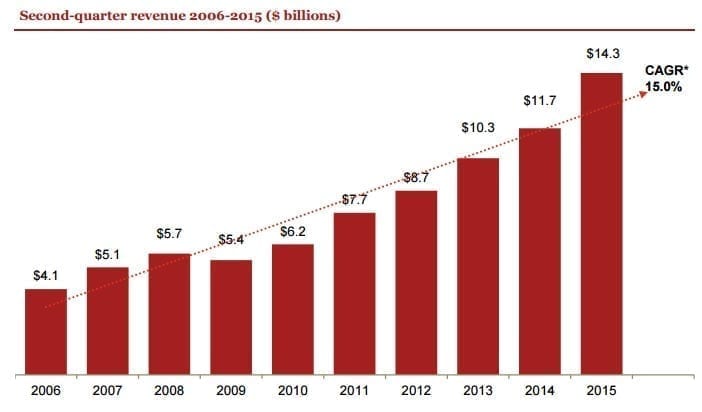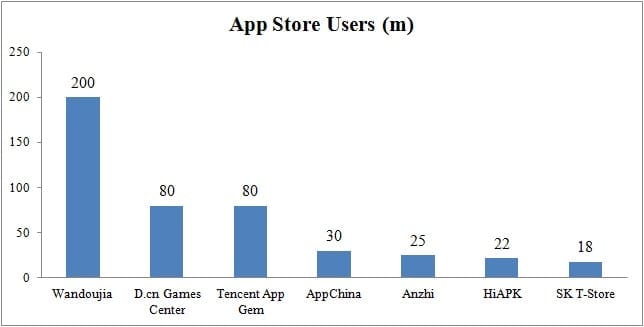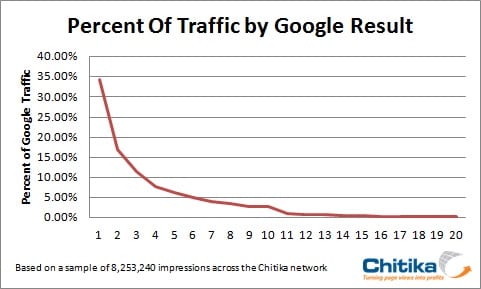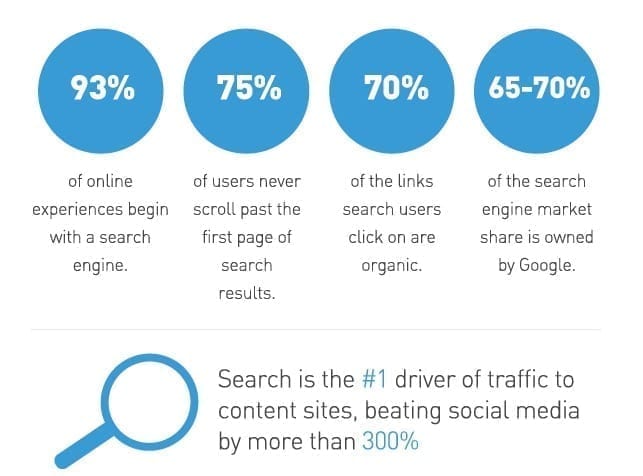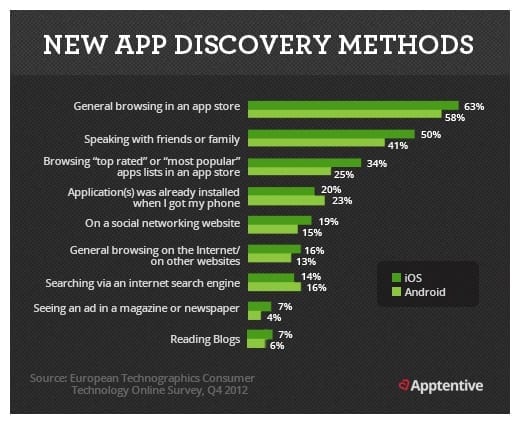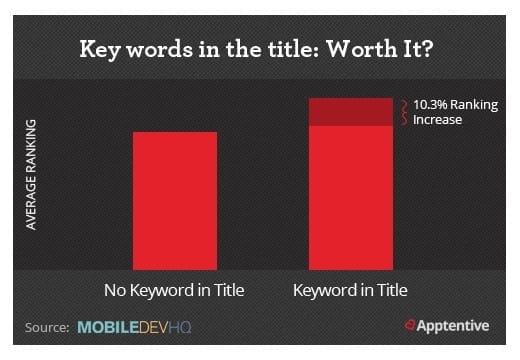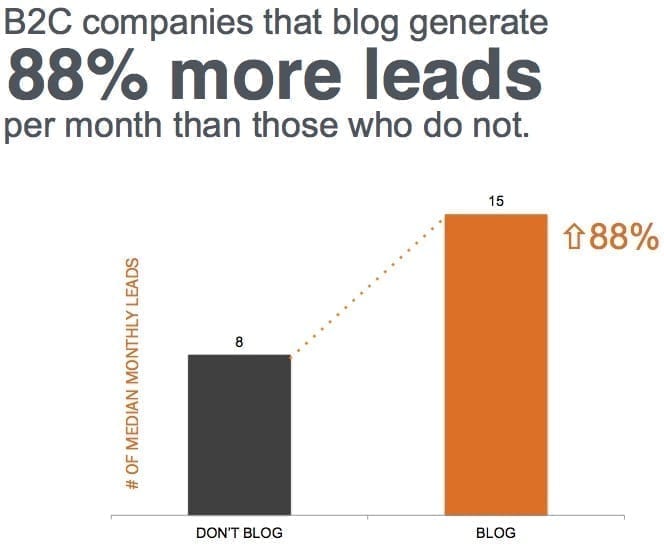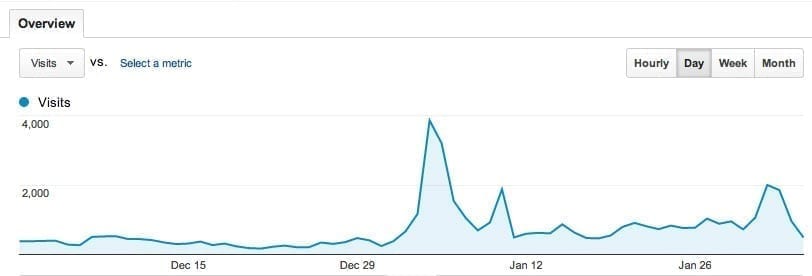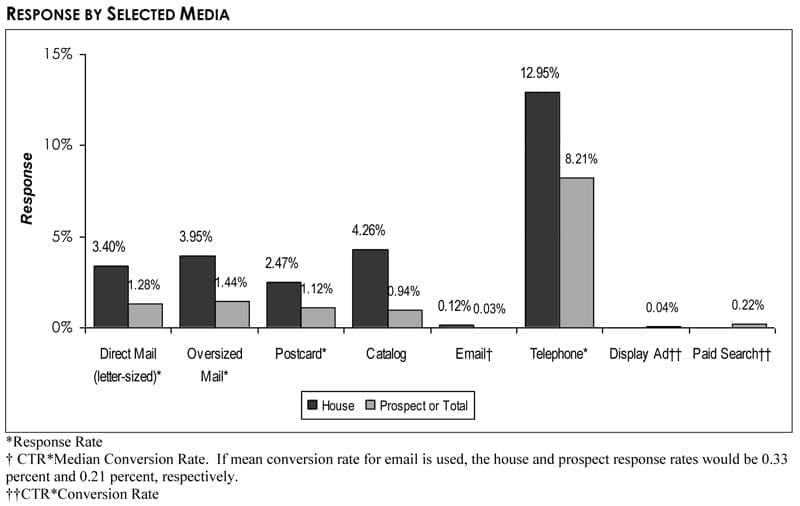Do you know how to promote your mobile apps?
What if there are tens of thousands of apps already in your niche, is it still possible to get lots of people to download your app?
Absolutely.
But don’t take my word for it. In this in-depth guide to mobile app marketing, I’ll show you how to build a useful app that people will be quickly download and use.
If you truly want to grab the attention of smartphone users, you need more than a mobile responsive website. You need a mobile app.
With nearly 70% of the global population having a smartphone, you can see that the future of mobile marketing lies with the apps.
The term app is short for “application software.”
The use of apps became in promoting a brand or product became necessary when mobile technology exploded few years ago, with more people using mobile devices to access the internet than desktop.
When this application software lives inside your phone or tablet, it provides seamless access to vital information that a particular website, portal, channel or API offers.
Since May 2012 ComScore have reported that more mobile subscribers used mobile apps to browse the web. In fact, a study by Flurry found that the U.S. Mobile Apps use has grown beyond Web Consumption at 94 minutes a day.
Mobile users love apps because no web address is needed, and all the tedious navigation menu of large media sites are bypassed.
The competition within mobile app developers is high. As I write this guide, more than 1.2 million apps resides on both Google Play store and Apple App Store.
Unfortunately, roughly 700,000 of these apps are considered dead – they’ve never been updated. Specifically, 65% iOS apps, 41% Android apps, and 69% Windows apps are dead.
And since these apps are dead, only few people get to see, download, and use them. It’s wise to always keep your apps updated, and don’t relent on promoting it.
Because it doesn’t matter how powerful and useful your app is, unless you actively market it, it’s as good as nothing.
Before we look at the 31 powerful mobile app marketing strategies to promote your mobile apps, let’s consider the 3-step process:
Step #1: Define The Purpose of Your Mobile App
Do you want to know what customers want in your product?
According to Harvard Business School,
“Marketers should think less about market segments and more about the jobs customers want to do. A Harvard Business Review excerpt by HBS professor Clayton M. Christensen, Intuit’s Scott Cook, and Advertising Research Foundation’s Taddy Hall.”
While validating your idea for an app, bear in mind that unless it’s useful to your target audience – you’ll be wasting time.
To justify the cost of creating a mobile app, you really need to define its purpose. No matter how effective your distribution channel is, if your app isn’t something people need, no one will be interested.
Hence, the purpose of your mobile app must be connected with the value it’ll provide for users.
Yes, you may use your own app, but ultimately you want the target audience to download it. They need it more than you do.
Remember that your mobile app doesn’t have to be out-of-this-world to fulfill a specific purpose.
What your mobile app represents MUST be clear to users. You can make a simple and clear introduction of your app in one sentence.
An example of a kitchen app with a definite purpose is Thyme:
So it’s a kitchen timer, which means that it can help chefs and cooks get more done on time.
Another useful app is Lumosity. It’s an educational mobile app that helps improve brain and IQ. See the purpose in red highlight.
With few exceptions, every mobile app should sync with social media to enable people share useful content or offers with their friends. But that’s not all. It should equally help people understand your brand better – even though you can’t easily measure the impact of your branding.
When you’re armed with this, then you can tell it’s time to design a mobile app that’s precisely targeted to do the job. In other words, the purpose, not the customer, is the fundamental focus of your app.
If you’re going to sell your mobile app, no matter how much you love the customer – nothing happens until you communicate clearly the “reason” why your so-called loved audience should download and use it.
Step #2: Validate Your Distribution Channels
We love mobile apps. There are several reasons why we can’t stop talking about them. I’m sure these 3 reasons will resonate with me:
How did you find your favorite mobile app?
Is it through a friend, from the Google Play store, Apple store, or someone sent you a direct link?
It doesn’t matter how. It’s obvious the app developers and marketers were keen in distributing it. They used the right distribution channels to get the app directly to you.
You should do likewise.
The ultimate measure of your mobile app success is when users find success as they download and use it. Period.
If you’re obsessed with a vision for transforming markets, helping your ideal customers, making real impact in a troubled world with your application software, and you’ve the insights and courage to make your idea a reality, you can’t fail.
Having transformed markets, take a look at Starbucks Weekly Mobile App Transactions. That’s $6 million in the Q2 2014. Mind blowing!
And guess what? It begins when you validate your distribution channels.
MaRS defined distribution thus:
“Distribution refers to the process of getting your product into the hands of your target customer, whether that is an individual consumer or a business user. Entrepreneurs need to identify effective distribution channel(s) to reach their target customer.”
Notice that knowing whether or not your mobile app will be a success isn’t connected to the customer, but the purpose.
As mobile use continues to grow 58% year over year, it’s your duty to identify the distribution channels that are bringing in these results.
Copywriters can relate with this. As a copywriter, you may recall that when writing product benefits, you’re not necessarily looking to understand whether or not the customer will like it.
What you’re concerned about are the “needs” or “questions” which they’re asking. Providing answers to them is what sets your copy apart from others.
To successfully market your mobile app, you need to validate your distribution channels.
But what does this mean exactly?
Well, I thought you should know by now.
Anyways, you already know that not all channels are created equal. For example, Facebook is a distribution channel, Twitter is, and so is Pinterest and LinkedIn.
In other words, any website or platform that allows you to promote your application software is a channel.
But here’s the fact:
All these distribution channels may not be ideal for your app marketing. You see, if your app is business-related, then I’m sure LinkedIn will play a big role – because there are more business people on the platform.
Facebook and Twitter are great too, but you have to filter thoroughly to find the right audience. With LinkedIn, you may not need filters.
Need more evidence?
Okay, let’s me illustrate with a concept you already know.
Pierre Omidyar, founder of eBay didn’t build the platform for the “auction psychographic.” Instead, he built the platform so that people can sell personal items easily.
What about Facebook? Well, if I’m wrong, correct me. But I don’t think Mark Zuckerberg developed the social site for the purpose of PPC advertising. He wanted to create a portal where people can connect with other people. Simple.
In like manner, Google was developed for the purpose of finding relevant information, not for those who love to search.
In validating the distribution channel, you’ve got to know what a particular site that you intend to promote your app stands for.
Doing so will help you produce and position your ad copy, blog posts, videos, podcasts, and more.
Step #3: Choose Your Revenue Model
Yes, you can make money from your mobile apps.
For example, In a post at Bluecloudsolutions.com, Carter Thomas shared a case study of how he and his team members built an app business from zero to $70,000 per month.
Okay, I get it: you may not earn that much, but even if your app brings in $10,000+ per month, it’s worth it.
Everyone looks for inspiration. It could be an inspiration for the day, for the week, a month or the one that lives with you 365 days a year.
In like manner, the motivation to continue with mobile marketing will fizzle out if you don’t have a source of income.
Even if you’re generating income from other sources other than the app, there’s a prestige that comes when you know that your project, product or idea is worth it – and people are actually eager to pay for it.
Unfortunately, many app developers have sleepless nights trying to choose the right revenue model. Don’t get me wrong: not all apps are developed to make money. This usually happens:
- When your app is borne out of your hobby. You’re doing it for fun.
- If you want to promote a “premium app” with this free one. It’s totally fine.
Apptamin has done a great job at clarifying the different app revenue models:
I’m particularly intrigued with the “Free + in-app purchases” revenue model. This month alone, I’ve spent $85 already to buy upgrades for my favorite action games. And I’m not compelled to do it – it seems necessary that I do it.
If you ask me, I think you should seriously consider this approach when monetizing your app.
Don’t make people see you as a desperate marketer. Instead, offer them valuable features for free, but give the option to upgrade if they like the app.
Do mobile apps make money?
Well, data doesn’t lie. At Google I/O, the largest Android developer conference, Google said that 150,000 developers are responsible for over 800,000 apps on its platform.
Although Google didn’t state the revenue numbers on their apps, recent data in their financial filings point somewhere around $900 million in pay-outs to developers “over the last 12 months.”
More so, here are Key App Revenue Statistics from Statista:
- Total app revenues are projected to increase from $45,37B in 2015 to $76.52B in 2017
- Paid-for app revenues growth forecast for 2017 – $1,95 billion
- In-app purchase revenues will grow to $28,9 billion by 2017
- The in-app purchase share of the total app revenue is projected to hit – 48.2% in 2017
- Apps contribution projection to overall iTunes revenue will hit 20% by the year 2020
And here’s the chart:
One of the core reasons why monetizing an app is easier than a website is because of its two-way communication approach.
Yes, a mobile app allows a digital connection between user and the brand so that both parties can connect, communicate and share thoughts with each other.
For example, if I download your app on my iPhone or Tablet, you can send me direct messages and I can respond.
You can even alert me of latest offers, discount codes, or new features and when I take advantage of them, you’ll know.
Through the GPS feature in mobile apps, an app developer can know exactly where users are downloading from and how they use the apps.
A website isn’t a two-way communication channel. Except you’ve live chat features and other interactive components.
Customers are obligated to visit your website to know what you’ve in store for them. Application software (i.e., mobile apps) are not like that – there’s no need to visit the business website. The app provides all the answers.
With this brief explanation, you can see the potentials of your mobile app. If you decide to monetize today, you’ll make extra income to support your business.
That being said, let’s explore the 31 powerful strategies to market your mobile apps and get significant results:
1. Take Great Screenshots of Your App Interface
It’s no longer a news that mobile apps are great for boosting your customer engagement and branding.
Since a lot of people now use the internet like never before, apps for mobile devices shouldn’t be option, but a necessity.
A 2013 survey confirmed that 48% of people around the world can’t check their emails and lots of other things without a mobile app.
Fortunately for you, you’ve succeeded in creating your business app, designed to help satisfy customers with their daily activities. You’re filling the gap. Be happy about that, because without your mobile app, people will find it difficult to live a happy life.
This tells you that your target audience are willing to download your app, only if they know about it.
And a good way of attracting them is by showcasing what your app can offer. Take great snapshot of your app interface, just like the one shown below.
Once your screenshots are ready, pin them to your Pinterest boards, share on Facebook, LinkedIn, Google+, Instagram, and use them on your blog.
Visuals are powerful ways of letting your audience have a clue of what they stand to get with your app.
2. Do App Store Optimization to Get More Downloads
It’s no longer about building your business app, but how to get them to your target audience.
A recent statistic by Appfigures shows the high population of mobile app in the three mobile app leading stores.
The competition can be scary, especially for beginners who are just starting out in app marketing.
How sure are you that your app will be seen in the midst of hundreds of thousands of other apps?
This has been a general problem among mobile app publishers. With more than 1.5 million mobile apps in the mobile store currently, getting yours a better visibility, though a tedious task, is very important.
And with search being the most common starting point for mobile research, it’s important that your app ranks highly for its primary keywords and key phrases.
As much as you can, make sure you use the main keyword that you want to rank for in the app title. For example, if you want your mobile app to show up on Apple Store, assuming that your main keyword is “flight booking,” then your app’s title should flow in this direction:
- Flight Booking App
- Hush Flight Booking
- Quick Flight Booking
It doesn’t have to be exactly these titles. But you know what I’m talking about.
An effective app store optimization (ASO) allows you to attract more users and get a lot of downloads, all you need is to know your target customer base, and keywords they are searching for.
Use these keywords on the title, description, and on the tags.
A report by Forrester revealed that 63% of apps were found via app store search.
Remember that app search optimization isn’t limited to the keywords alone. You also need to promote your mobile apps as well.
Share the link on relevant discussion boards, give the app away so that authority sites can send you backlinks. Share on social media to garner some social signals, too.
3. Use Guest Blogging to Promote Your App
Guest blogging is as old as blogging itself, but it’s very effective. For example, GrooveHq, a digital marketing company that offers help desk solutions generated over 1 million people by guest blogging.
Take a look at the huge traffic from guest posts:
You may not get 1 million downloads on your apps through guest blogging, but you’ll definitely attract tens of thousands of new app users.
You just have to get serious with guest blogging. It’s a lot of work.
The mobile app industry is one hell of a competitive zone, with more than 1.5 million developers.
Despite the difference in areas of specialization, they all strive for one thing – recognition.
Guest blogging is a form of inbound marketing. Therefore, build your app visibility with inbound marketing, and trounce your competitors.
A recent post by Ryan Ghods on HubSpot revealed that 93% of companies using inbound marketing have generated more leads.
Inbound marketing can be done in so many ways, but guest blogging happens to be the most effective.
You want to know why?
Well, guest blogging provides a situation whereby the blog owner gets valuable content, and the guest blogger gets access to a new audience. It’s a win/win for both parties.
If you wish to gain authority, qualified traffic, relevant links, leads and sales in your business, you need to start guest blogging today.
Though it’s not a short cut, extra effort is required to create creating engaging content, which has been the major challenge for most most B2B marketers.
But if you’re able to come up with an engaging content, relevant to your product/services – you won’t only increase your chances of generating more leads from your guest posts, but also from search engines – even as your posts begin to dominate organic search for long-tail keywords.
You also get links pointing to your mobile app’s page or app review page on your blog.
According to Moz, search engines like Google rewards blog that have trusted and relevant backlinks.
A lot of people believe that since Google Play Store is owned by Google, it means that you could get more app downloads and subscribers if you optimize for keywords and build links.
Because the same rules that apply for organic search rankings seem to apply in app optimization as well.
I trust you’ll start guest blogging right away. Will you?
4. Hire Mobile App Marketing Agencies
You’ve just completed a successful app design and development. And now you’re faced with marketing challenges.
Though you’ve tried integrating lots of marketing strategies, but still haven’t seen any improvement on app downloads or in-app sales.
You’ve millions of people ready to download your app. Statista estimated that global app downloads will surpass 100 billion in 2016.
Is it possible for an app to get drowned and not enjoy a slice of this downloads?
Absolutely.
But don’t feel bad about it.
There’s is good news.
You can hire a mobile app agency to support you.
A mobile app marketing agency is a company that specializes in helping business owners get their apps to their target audience. They have got the right networks, expertise, and tools to promote your mobile app.
You could make do with these agencies:
With the increase in mobile usage, especially for accessing the web, rooting yourself deeply into it will definitely boost your mobile downloads.
It’s now a clear statement that companies should also be driven by mobile-first approach, and not just building mobile presence.
This is why you need a mobile app marketing agency, instead of depending on your in-house efforts.
In order to attain a great success, you need to leverage on what other agencies have built over the years. Relying on a trial and error method will waste your time, energy and money.
But by hiring a mobile app marketing agency, you can rest assured that your app marketing is in the hands of professionals.
5. When You Launch, Make It Big
It’s obvious that mobile app is the trending item nowadays. Companies of different kinds and sizes are now embracing mobile marketing.
That’s good news.
Because it’s the direct result of growth in mobile technology, and consumers wish to remain connected on the go – and spending more time on mobile apps.
As the mobile app market has increased dramatically, it’s very important to have your brand’s presence on this platform.
Having developed your app, bringing it to your audience is very important. That’s why you don’t just have to launch it, but make it BIG.
Get the right tools, promote the app, send press releases, leverage social media marketing, and if your app is truly awesome (and it should), you could launch a kickstarter campaign to get more traction.
Why not?
It’s not so difficult to get the downloads rolling in on the launch date. Get the attention of your target audience by sending out a newsletter, and hit virtually every part of social media.
Below is a statistic showing the number of seconds spent on links by various social media referral sources:
The above statistic should also serve as a guide – letting you know which social media platform is best for building momentum with your app.
You and your team should devote time in hyping your product prior to the launch. First impression matters a lot. The first wave you put in move gives you insights on how best to adjust your hype – if there is need.
6. Maintain The Hype: Get a Steady Stream of Review Websites to Cover Your App
Launching a successful app into the various platforms may sound easy, but it’s actually complicated. The most disappointing aspect is not getting people to download the app.
One of the ways to inspire people that your app is right for them, is through online reviews. According to Search Engine Land, “72% of consumers trust online reviews as much as personal recommendations from real people.”
With the level of mobile app market currently, consumers are mostly after apps that can help resolve their problems, and make internet use easier and fun.
Unfortunately, as most app developers rejoice as they see hundreds of their apps downloaded, the rate at which users uninstall apps is huge.
A recent statistic by Apsalar shows the global average uninstall rates of app over time.
I’m sure you wouldn’t want your app to be one of them.
Get a steady stream of review websites to talk about your app.
Even after the launch still maintain the hype. Keep promote your app and the results will overwhelm you.
When reviews sites talk about your mobile apps, it positions your app where the right audience can find it. It also helps to improve your organic search rankings as a result of the review ratings and stars.
A post by Adrien Montcoudiol that shows how to grow your mobile app user base, made it clear that description and review has optimum effect on mobile app marketing.
7. Design And Share Interesting Infographics
Mobile app marketing has become a resourceful means of growing revenues for most marketers. In fact, mobile apps have led to increase conversion rates for these brands, according to Bob Bentz.
Yes you can grow your app visibility and increase downloads by designing and promoting your app idea or topic through infographics.
This can be done by finding events and topics related to your app features, and developing interesting data points on them.
Research has found that man has a shorter attention span, and information presented in visual is easily absorbed by the human brain.
Does infographics work?
Yes the do. Don’t you need proofs?
Okay, in 2010 when Neil Patel started releasing infographics on the KISSmetrics blog, they generated an additional 2,512,596 visitors and earned 41,142 quality backlinks.
In 2012 Copyblogger published an infographic titled 15 Grammar Goofs.
It’s unbelievable, but till date, that infographic alone has generated 6,000+ tweets, 49,200+ Facebook likes, 1,700+ LinkedIn shares, 1,700+ Google+ shares, a gargantuan 176,500+ pins and well over 230 comments.
I could go on and on to show you countless case studies from brands that have successfully used infographics to grow their business.
These examples, though not related to mobile apps marketing shows how powerful infographics can be.
If you want to use infographics to promote your apps, make sure that your content is closely-related to the app features (and benefits) and you must promote it as well so you can get consistent backlinks and viewers.
8. Apply For App Awards
Does your app stand a chance of standing out from the rest?
Data from Statista shows that Apple’s app store being one of the most prominent mobile app store gets more than a thousand apps published per day.
You can increase your chances of getting a better visibility among millions of apps in the app store, by engaging in a contest.
Apply for app awards such as BMA, and lots of other app awards, to get your app internationally recognized if you eventually win.
Of course you’ll have to strive to emerge the number #1. That’s the best way to enjoy multiple benefits like exposure, feedback and credibility. No doubt it’s a good app marketing strategy.
A statistic by Data Charts reveals that 33% of apps recommended by people gets downloaded.
9. Resolve Negative Reviews Promptly
There are lots of apps out there, about 1.5 billion in the Apple Store and 1.6 billion on Google Play.
You can see the consumers have to be smart when choosing an app to download.
Yes, every company wants their app to be downloaded, installed, and used. But how many of these companies are ready to resolve negative reviews promptly?
A case study commissioned by ITR to identify the reason for the high rate of uninstalled app shows the following:
Obviously, the chances that your app will be uninstalled is high. That’s why you need to put every users’ complaints into consideration.
Remember that a loyal customer today could switch to another brand as a result of unresolved complaints. Tell me, who wants to lose a loyal customer?
Several studies have found that it takes 7x more to acquire a new customer than to retain already existing ones. User acquisition is obviously crucial, but retention is equally important.
Treat your customers like kings. Because they are.
And don’t forget that customers who complain are more likely to make a purchase, and use your service again if their reports are properly resolved.
10. Contact Adminds of Related Facebook Groups to Mention Your App
Let the world know about your app.
Using Facebook to achieve this is a great strategy, since Facebook is the most frequently used social media platform on a daily basis.
Despite its popularity, most marketers are yet to fully utilized all the features of this social media site, like the Facebook groups.
A Facebook group is easy to create, but it can help you build up a business and grow your fan base.
You should leverage on this Facebook feature, and get your app much bigger exposure.
Contact admins to related group to mention your app in their groups. You could offer the incentives (e.g., free apps download, discounts).
To learn more, see this guide:
- How To Network with Facebook Groups
- How to Use Facebook Groups to Get More Traffic and Traction for Your Blog
11. Consider Offering a Promotional Price
When it comes to marketing as a whole, several studies have proven that customers are more likely to make purchase when offered promotional offers.
You can entice your customers with promotional offers. Though it might look like you’re losing money – but it pays to build a loyal audience first, before cross-selling or upselling them.
The power of promotional offers is magical. When customers get things for free or at a discounted price, they’ll feel obligated to your brand, use more of your products and services and eventually tell others about their offers.
All these you stand to gain when you give away promotional offers.
And it’s more like creating awareness for your app, which is very effective when you’re looking for more downloads.
12. Promote Your App Graphics on Pinterest
Are you leveraging Pinterest yet?
With Pinterest, you can share irresistible graphics, discover new interests by pinning images or videos to boards. You can also browse what others have pinned.
Pinterest is developed to handle visual content only. So you’re on track to promote your app graphics on this platform if you make up your mind right now.
Discovering your app among millions of apps in the app store is the biggest challenge of marketers. But you can make a difference by sharing your mobile app graphics with others.
If you’re tight on budget and you’re looking for an inspired audience, Pinterest is best for you.
Fishes only thrive in water.
Your app graphics may not thrive in other social media sites, but it’s a huge chance of going viral on Pinterest. It’s a good place to promote and advertise your app graphics and related images.
Here’s an example:
Pinterest has one of the most active social media users. These users are passionate about visuals. It’s like they’re trained to respond to these images willingly.
Interestingly, these people are ardent shoppers.
A Report from Sprout Social stated that 93% of Pinners shopped online in the past 6 months.
By sharing your mobile app graphics on Pinterest, you’ve the opportunity to network with your industry peers as well as potential customers.
13. Know Your Audience And Recruit Them Manually
Where do you customers hang out?
Discussion boards. Blogs. Twitter. Facebook. Instagram. Reddit. You just name it.
The moment you become aware of where they spend their time at, it’s your responsibility to get into the conversation. It’s high time you know your audience. Don’t promote your app blindly.
Ask yourself this question, “who do you think will be needing your mobile app and where do they visit to ask questions?”
I just thought about…
Quora.
You can connect and communicate with a lot of your target audience on Quora – the best and most popular Question & Answer social networking site.
Once you have known who your audience is, and where they hang out to discuss pressing issues, it’s time to start creating awareness of your mobile app.
Answer questions related to your topic – it doesn’t have to be particularly relevant to my app.
As much as you can, woo as many of your interested audience to your mobile app’s page or website and build relationship with them.
14. Run a Contest
Using contests can skyrocket your mobile apps business. In addition to getting user-generated content, contests quickly help people answer the question, “what’s in it for me?”
A study conducted by Buffer showed that 35% of Facebook fans liked Facebook pages specifically to compete in contests. Contests obviously nudges people to enter it.
In fact, In Buddymedia’s report, we found that contest-related words like winner, win, entry, contest, enter and promotion seems to engage users more.
Running a contest, especially on social media is a wake-up call for people who have always desired to promote your content – but couldn’t find the best possible way.
People will promote your app on their own private social media channels, especially if the contest involves the need for votes.
When entrants post their content on Facebook, Twitter and Pinterest, it’s an endorsement of your personal brand.
Shoeboxed Messy Desk Challenge is a perfect example of a contest. The company asked entrants to send a of their messy desk.
Shoeboxed devise a strategy and promoted the messy desks on its Messy Desk Gallery and Pinterest Board.

What’s the reward?
The focus is on the messiest desk. The entrant that sends it would receive an iPad mini with the Shoeboxed app installed. Isn’t this relevant to app marketing?
The result:
Shoeboxed received well over 200 messiest photos within 48 hours of making the contest live. What’s more? The press release that was sent out garnered 155 quality links, too.
You could even give away products that you offer for sale on normal days, as a reward to get more people to enter your contest. The reward doesn’t have to be a mobile app download alone.
How about a great meal?
It’s time to maximise your presence in social media platforms, by running a contest, that challenges people to enter and tell their friends to do same.
Contests are great for marketing your mobile app and giving it that initial boost that will increase its chances of going viral.
15. Create a Facebook Group
Contact Facebook groups’ admins to mention your mobile app is great. But how about creating your own Facebook group?
Why not create the group on LinkedIn, rather than Facebook?
Well, here’s why we recommend Facebook:
Massive audience!
I guess that’s exactly what you’re looking for, right?
What you need do is – gather like-minded people and build a community. Don’t make the mistake of promoting your mobile app at every given opportunity.
On the contrary, answer questions, create interesting and rich content, and only recommend or talk about your app when necessary.
When people are engaged, you know you’re ready to use your group to market your business.
If your mobile app is related to “Running” then create a Facebook group that unites Runners under one umbrella.
As these people socialize and feel important, they’ll convert into app users or customers.
16. Leverage Push Notifications Marketing
What are Push Notifications?
Here’s how Urbanairship.com defines it:
“A push notification is a message that pops up on a mobile device. App publishers can send them at any time; users don’t have to be in the app or using their devices to receive them.”
And there are several types of these push notifications that you can use, both for eCommerce, mobile marketing, and digital marketing in general.
With Push Notifications, your app can notify a user about your new update, post, event, and more, though the user may not be actively using your app.
For instance, if a user is using Android device, your logo appears on the status bar immediately the device receives a push notification.
Does that sound strange?
See, you have to know that technology is advancing at the speed of thought – marketers, entrepreneurs, large, and small businesses are on the lookout for opportunities like this – to supercharge their business.
Push notifications work. In fact, this study reported that it produces a 97% response rate.
Technology today is simplifying the way people live, do business, and travel. You don’t want to be left behind. Do you?
As a marketer, you can decide to send push notifications to your target audience or selected group of people.
Read what David Cheesewright, Wal-Mart International President and CEO said about technology:
“Wherever we operate, everything starts with the customer, and I see customer’s shopping habits changing more rapidly than I can remember.”
He added…
“Customers are shopping more online, with mobile devices, and they really like convenience. If our customers changes fast, we have to change even faster if we want to continue to exceed their expectations.”
Some elements to ensure that push notifications yield results:
- Title: It shows push notification sender.
- Icon: It shows the symbolic identity of the sender.
- Text: It shows the message of push notifications with the first 60 characters if it’s iOS banner and 45 character If it’s an Android banner.
If your Push Notifications notify “a-user-using-another-app” of your message, the tendency of the user closing the message is high – unless the message is compelling.
17. Use QR Codes
QR Code is one powerful technology for marketing our mobile apps. Here’s what each letter stands for:
- Q – Quick
- R – Response
To use QR Codes, you must have smartphone equipped with camera, QR code reader, or scanner application feature. New smartphone types available today often have an app pre-installed on them from the factory.
And how will QR codes help you promote your app?
A QR Code scans A smartphone’s camera scans a QR code to reveal codes, passwords, websites, and other essentials.
These codes are great marketing tools for today’s business. It can help bring your mobile app to limelight.
The illustration below shows you the basic steps required to scan a QR Code:
When you’re ready, you can generate QR codes from goqr.me.
18. Take Advantage of Mobile Advertising
Mobile advertising has redefined how business market their business.
Trust me, it can only fail when you have an ineffective strategy and use a wrong approach. When your approach is not workable with your specific campaign goal, it’s bound to fail.
A report from Yahoo! Inc. states that Tablet, a mobile device is the Number #1 contender for screen dominance.
Infact, 20.3 million tablets grew to 82.1 million by 2015. iPad, a family of tablet also received growth in sales by 36% in US alone.
Mobile is a fertile ground for digital product promotions, especially your mobile apps.
Don’t believe me, read the report from IAB yourself.
This successive growth year after year is phenomenal. Mobile advertising is the right place to advertise and promote your digital product and services.
Therefore, take the advantage of mobile marketing growth rate, effectiveness and dominance to project your app to your target audience.
19. Feature The App in Your Emails
In content marketing, it’s expected that you post, update, and send newsletters to your target audience for branding and building stronger customer relationship
Do you by any chance know the power of email marketing?
A study by Email Monday found that email delivers ROI of 3800%, and 83% of B2B and B2C marketers use email marketing.
That’s why it’s very necessary that you keep growing your email list. Create an avenue to inspire audience to subscribe to your newsletter.
As you send newsletter, updates, and post, feature your apps in your emails so that your target audience can become aware, and make attempts to download, install, and use your app.
An app that’s invisible to users can never get popular or generate income.
It’s a smart choice to make your customers get used to your app, they will download and install it someday.
But make sure you keep them updated on what’s going on with your mobile apps. Give your app the exposure it deserves – through emails.
Already, 82% of marketers are leveraging email marketing technology to grow their business.
20. Consider Alternative App Stores
The fight for visibility is getting messier. The duo: Google Play store for Android and Apple App Store for iOS, are the most popular app stores.
More so, they’re the biggest distribution outlets for mobile apps.
App store users are in their millions according to a report from mobyaffiliates.
What do you expect?
Popular app stores are extremely competitive.
You need to look for alternatives. They may not be as popular, but you can quickly dominate the front page or category pages with your app.
The competition isn’t too intense in these alternative app stores. It’s practically possible to grow visibility faster.
These apps stores offers a lot of benefits for marketers, and they’re starting to gain new grounds as strong app marketing and distribution channels.
Some of the app stores that you can try are:
21. Take Advantage of SEO For Your App Review Pages
The question you should be asking yourself is, what makes content rank highly in the organic search listings?
Remember that if you rank at #1 in Google’s first page, your app review web pages can drive up to 35% of the entire first page traffic.
Until you’re able to clearly answer that question, you’ll be going in circles without making headway.
One of the effective ways to rank your app review pages in Google top organic results pages is by optimizing your primary keywords.
When writing your app reviews, feel free to use long-tail keywords, but avoid keyword stuffing. Provide value, and increase your chances of being selected from app store as a viable search result.
There is need for you to write a review that defines and describes what your app does to your target audience. In your app’s review, obey SEO rules and you’ll generate more traffic and increase your app downloads.
No matter how vast mobile marketing is going, organic traffic can never be ignored. The No. 1 driver of traffic to content sites is still Google search.
22. Create Irresistible App Icon
After designing your App icon, can you boldly say, “I am happy with my end product?”
Designing an app icon that users can’t ignore is hard. You must be good at what you do to create an icon that represents your app well.
It’s often said that “first impression matters.” What comes to mind when you see these brand icons?
Humans are visual creatures. People are drawn towards beautiful visuals. That’s why we gaze at good houses or cars and appreciate them.
We are irresistibly drawn beauty. Therefore, designing an icon that speaks and represents your app should be the first step to promoting your app. And it has to be done well.
Consider the shape and size, the color, avoid irrelevant wordings, incorporate borders.
Funny enough, looking over your competitor’s app icons would be a smart decision you can make to kick off. Here are 5 Steps to Designing the Perfect Icon for Your Mobile App.
23. Begin Marketing Within Your Mobile App
State the problem your app solves. The solution your mobile app offers in clear terms make it easily discoverable by your target audience or customers.
Your mobile app marketing can be enhanced via the following:
i). Be helpful. In garnering attention initially, focus on helping people with their questions. Don’t be overly promotional. It doesn’t work.
It’s important to search for users who have a problem you can help them with, give advice and other assistance as much as you can. And your app downloads will flow in naturally.
ii). Focus on one user per time. When you’re able to attend to a user satisfactorily, the person is bound to tell another, and your app marketing can make do with such word-of-mouth.
The multiplying effect of this practice can birth a small group of users of your mobile app. Make sure to keep them engaged.
Keep the conversation open, promptly attend to their questions, listen to their feedbacks etc.
iii). Offer trial versions. In a bid to obtain your potential app users data, it’s important to offer trial versions of your mobile app that are free. This is one way to get them to sign up for a paid plan when the trial period elapses.
iv). Promote your app yourself. Use your app name as your bio on the different social media forums where you have active accounts.
And also try to provide answers to people’s questions across other discussion forums like Reddit, Quora, etc. That way you’re seen as a go-to authority, and your mobile app will be most desired.
v). Build your subscriber list. Above all, make sure you continually capture email address and grow your list. This makes it possible for you to send your mobile app marketing updates across to a good number of people.
In addition, encourage your app users to leave a rating on app stores. People like mobile apps, and can easily do this once they’re satisfied.
24. Make Your App Visibile Online
Social media is the lifeblood of your mobile app marketing. Don’t ignore it.
To make the most of social media, you need a deliberate, actionable plan. Mashable is a good case study.
This is how you can engage people via social media to improve your app online presence:
i). Engage your community. Go beyond just having a profile on Facebook, LinkedIn etc., to creating groups. It’s not just a way to build a community of like-minded people, but the best way to improve your app branding.
ii). Create and share interesting content. Since a picture is worth a thousand words, content that’s visually enhanced is compulsory.
There are tools that can help you produce the compelling content. Tools such as Canva, Pictaculous, Slideshare.net, and so forth should never be ignored.
Actively take part in discussions and comments on interesting content.
iii). Connect with your circle. Keep your Google+ circle members updated on your most recent mobile app launch, feature, or giveaway, every step of the way, and on time.
iv). Make contributions to other online conversations. Don’t sound promotional when you answer questions, or give valuable comments on forums. Remember that you’re indirectly building your online reputation.
That being said, your app stands a good chance to be selected for awards, if and when you do apply for these awards.
There are a lot of organizations that give prizes to new and inventive applications for their capability, composition, and more. An example is the Webby Awards.
25. The Unique Aspects of Your App Must Be Consistenly Emphasized
Who cares about your mobile app?
All your potential mobile app users care about is the problem it can help them solve. Therefore, state state the unique solution that you app brings clearly. This way, you’ll attract even more users.
Getting on, your mobile app is better off with personalized logo stamp and a slogan.
Use wallpaper layouts and posters that your mobile app users will love. Share among those who will actually care to put these wallpapers up. What a great way to promote your app?
Carefully choose your app’s caption and keywords. They’ve been tested to boost your mobile app rankings in specific categories, which is one reason why you need to get it right with app store optimization.
There are contests often organized by companies involved with mobile app discovery services. Apply and get involved.
Try and partner with another app or developer. Take turns promoting your apps. It establishes you as a reliable team member, and a worthy team player.
26. Your App Message Must Be Tweetable
Why twitter, you may ask?
Most of your influencers are probably more on this social media channel.
Within the top 100 global brands, 42 of these brands have top-level marketing executives with Twitter accounts. Twitter proves to be a far better social media platform for your mobile app marketing.
In all of your conversations, especially when you use hashtags, make sure you include links to your app website, blog, and social media channels as many times as possible.
Your mobile app campaigns can be effective offline as well. It only require a high concentration of your target customers. All you need do is show up with solutions that are relevant to their needs per time.
27. Reach Out to Your Mobile App Influencers via Email
Email marketing has much more potentials than what the average mobile marketer can make of it.
This is true, especially where your emails are optimized and segmented, your mobile app marketing has a greater chance of yielding a significant ROI
You can also influence your local community. Assuming the solution your mobile app provides is targeted to address a localized problem, consider a local mailout.
There are a handful of strategies to reach out, in order to make the most of such local influence. This includes the following:
i). Organize a challenge. Let your audience know how they can participate, in order to complete a certain task or tasks and tag themselves with hashtags on social media platforms.
This defines your mobile marketing as trendy, which can go beyond the roofs like the messy desk contest we talked about earlier (still remember?).
It’s easy to replicate the success of Shoeboxed. It all boils down to rewarding your contestant’s effort publicly.
ii). Giveaways have become easy. Your mobile app marketing can take advantage of giveaways, to gain traction.
People love free stuff, which is now quite easy to generate with the assistance of the likes of Rafflecopter, PunchTab, et al.
Also discounts and cheaper prices on certain days can pay off big time for your mobile app marketing – but remember to let your mobile app users know via push notifications, and your email newsletter.
iii). Prior users of your mobile app should be engaged again. Not only would you succeed in regaining the trust of your app users but retain their loyalty. Thanks to Google’s engagement campaign strategy, Facebook mobile advertising, and more.
iv). Pitch for speaking engagement. Make efforts to land public speaking engagements. Your mobile marketing can benefit so much from the audience, and immeasurable support.
Though an opportunity to share your wisdom at conferences, panel discussions, and exhibitions, don’t forget it’s more about the problem that your app can solve, not about the users you want.
28. Develop an Accompanying App Video
Add a video intro to your mobile app.
Of course, you need to do this with caution because a video becomes an option when your app has proven effective on other channels or formats.
A survey conducted by Spectrecom Films showed that, “73% of respondents find videos helpful when making purchase decisions online.”
That taken, you’re bound to spend a lot of money to produce a video for your app. This may not be very convenient especially when your mobile app has changed several times since its launch. Take a look at Sandwich Video.
Create a YouTube channel for your videos. Post interesting content regularly, from series, development updates to industry news, and more.
Given YouTube’s popularity, your mobile app marketing videos can be a part of over one billion daily views from mobile devices.
In addition to your channel, your mobile app marketing can take advantage of podcasts. Your mobile app should emphasize on the problem you solve and how you solve it. Fizzle is a good case study.
But don’t be limited by podcasts. You can leverage slide presentations as well.
Your mobile marketing Slide Presentations can help someone start a project. So start creating slideshare presentations, and increase your app downloads today.
29. Prove Your Expertise by Starting a Blog
A blog is no longer a personal diary as we know it.
Truth is, you can prove your expertise through blogging and effectively market your mobile app. There are so many success stories to that effect.
For one, you can generate even more leads (in this case, app downloads) from your blog. [source]
The more you create content related to a particular subject or topic, you’re positioned as an expert.
And if you write about topics that are closely-connected to your mobile app, you’ll increase engagement and downloads.
Is a blog really that importantly?
Yes, it is. According to HubSpot, companies that blog consistently generate 88% more leads per month than those that ignore blogging.
In addition to starting your own blog, you should guest blog for other industry blogs and share your mobile marketing skills.
Use your author bio to link back to your app page. You can send guest post pitches to tech blogs, and create useful content for their audience.
Connect with other writers in your niche. This is one effective technique a handful of good writers use.
A writer who is interested in your niche can write about your mobile app solution – and link back to you.
Your mobile app marketing can’t do without content discovery tools such as Disqus because it offers the best add-on tools that powers discussions, increases engagements, and eventually, boosts your revenue.
30. One Month Before Your App Launch, Build a Teaser Website
Not a full-blown website, but a landing page. It’s solely for your mobile app marketing. It should convey the message of your mobile app in clear and simple terms. Add a form to the landing page to capture user’s email address.
Add a “tell a friend” in-app component to enable users promote your app. This makes it possible for these users to share your app with their friends, family, coworkers, and colleagues. That way, you’re able to increase your site visits.
Your mobile marketing can benefit more when you offer credits and discounts for every new subscriber someone brings. Use some tools to exchange your ad space with other mobile apps. An example is Appsfire.
31. Reach Out to Journalists to Get Needed Press
Do you have an app launch party in view?
Make one and let it be fun, interesting, and engaging. This is a great way to bring together your mobile app users get press attention, which in turn triggers responses across channels.
If you announce your app launch well, and offer some form of incentives, news media sites like Mashable, Techcrunch, Gizmodo, Lifehack.com, and the like could pick it up.
When building momentum for your app, focus on the benefits and the key features. Capitalize on the most interesting features of your mobile app, such that your audience can’t resist it.
You can also use Guerilla marketing to promote your mobile app?
One simple way to get started is to develop small app Cards and share them in Local Business Outlets, Cafes, etc.
Build important relationships with editors, and get recognized for developing a mobile app that truly helps people.
On a regular, share content that are interesting across other social media channels such as Pinterest, Instagram, and LinkedIn. Make sure to use your images with your mobile app trademark.
It’s better to first share such a content on your blog, and from there sync images and share to other blogs. Interested users are certainly going to enjoy the content on your blog.
Above all, you’ll likely get press attention if you continually update your mobile app.
Conclusion
Last but not least, if you want your mobile app to reach hundreds of thousands of users, you might need to run a Facebook ad or Google Ad.
Free marketing strategies sometimes take a lot of time to produce results.
Paid advertising can get you 10,000 downloads by this time tomorrow.
Above all, marketing your app consistently is the only way to guarantee you attain long-term success. There’s no shortcut. But the rewards are worth the while. You don’t need to hire a mobile marketing agency either. Just follow the strategies listed above.
